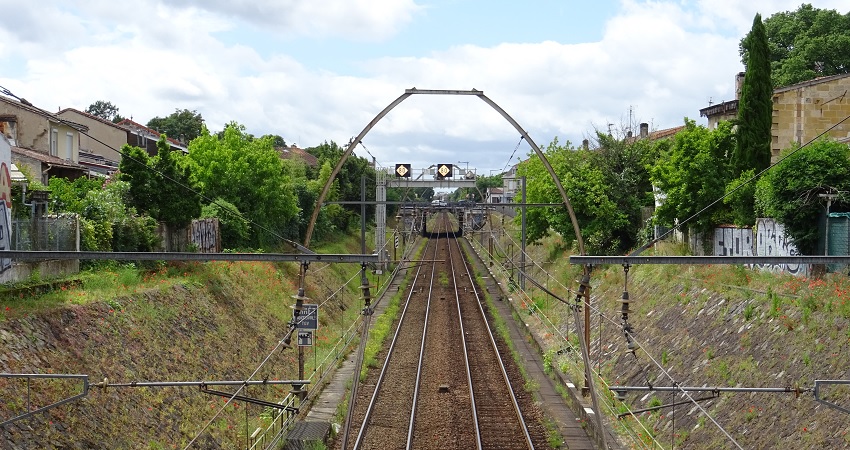
※ オフィスアワーは【通年】日時を指定せずメールで事前予約。
※ 北大 オンライン授業導入ガイド(Guide for Online Lectures at Hokudai)、北大SSOシステム
※ 文理融合政策事例研究、行政学、演習Ⅰ(1学期)、政治学総合演習Ⅰ、科学技術政策特論、技術政策学、演習Ⅰ(2学期)、行政学特殊演習、公共政策特別研究
1.公共政策大学院「文理融合政策事例研究」(1学期:月4・月5)
※ 西村聡先生・土井翔平先生と共同
● キーワード
科学技術・イノベーション、公共政策、政策決定、政策実施、政策評価、ガバナンス、基本計画、テクノロジー(リスク)・アセスメント、リスク・マネジメント、リスク・コミュニケーション、規制政策、公共事業、国際標準化、インフラ整備、環境問題
● 授業の目標
北海道大学公共政策大学院(HOPS)は、2005年に法学部・経済学部・工学部が共同で創設して以来、「文理融合」を理念の1つに掲げ、全国のどの公共政策大学院と比べてもかなり特徴的な、学際的でシステマティックな「文理融合」への取り組みを行っている。
本事例研究科目では、いわゆる文系・理系に跨る政策課題・テーマをいくつか取り上げ、それに携わる実務家・研究者などをゲストに招き、講義と質疑応答を通して現状を理解するとともに、政策を立案・実施するのに必要な知識や考え方、政策課題の解決に文系・理系の知識や視座がどのように活かされていくのかを学び、文理が融合する政策における政策立案の能力を獲得することを目標とする。なお、本科目では、グループワークを通じて政策提言を行い、実務家等からフィードバックを受ける形式を採る可能性もある。
本科目では、公共政策の一般理論も話題にすることを予定しているほか、いわゆる文系的思考と理系的思考の相互作用を体感しながらそれらを可能な限り融合し、既存のディシプリンを超えて、公共政策上の様々な問題解決に必要な総合的・実践的な専門性を身に付けてもらうことを目標としている。1年次・2年次を問わず、文理融合政策に興味のある全HOPS生向けの事例研究科目である。
● 到達目標
(1) 文系・理系に跨る政策課題・テーマについて、それに携わる実務家・研究者等からの講義と質疑応答を通してその現状を理解することができる。
(2) 文理が融合する政策の立案・実施するのに必要な知識や考え方、政策課題の解決に文系・理系の知識や視座がどのように活かされていくのかを理解することができる。
(3) 文理が融合する政策の課題とその解決の方向性について、主体的かつ現実的に考えることができる。
● 授業計画
本科目では、1つのテーマについて、受講者による演習(1講目)と、招聘するゲストによる講義・質疑応答(2講目)を通じて検討することを原則とする(過年度の招聘ゲストについては下表と下記ホームページを参照)。なお、講義の部分をHOPSセミナーに位置付ける場合もある。
HOPSでは、その「文理融合」の取り組みをいっそう深化させるべく、通常並列的に取り扱われ、議論が拡散しがちで多岐に渡るテーマをある程度一貫性のある形で展開していくための教育・研究プログラムを設けている。本科目はその一部であり、いわば座学としての前提科目「技術政策学」を補完する。
HOPS生には、本科目受講後に上記プログラムにも積極的に参加するとともに、本科目で学んだことを他の関連科目やリサーチペーパーの執筆(「公共政策特別研究」)にも活かすことで、公共政策上の問題解決に必要な「文理融合」の総合的・体系的な専門性と思考様式を獲得することが期待される。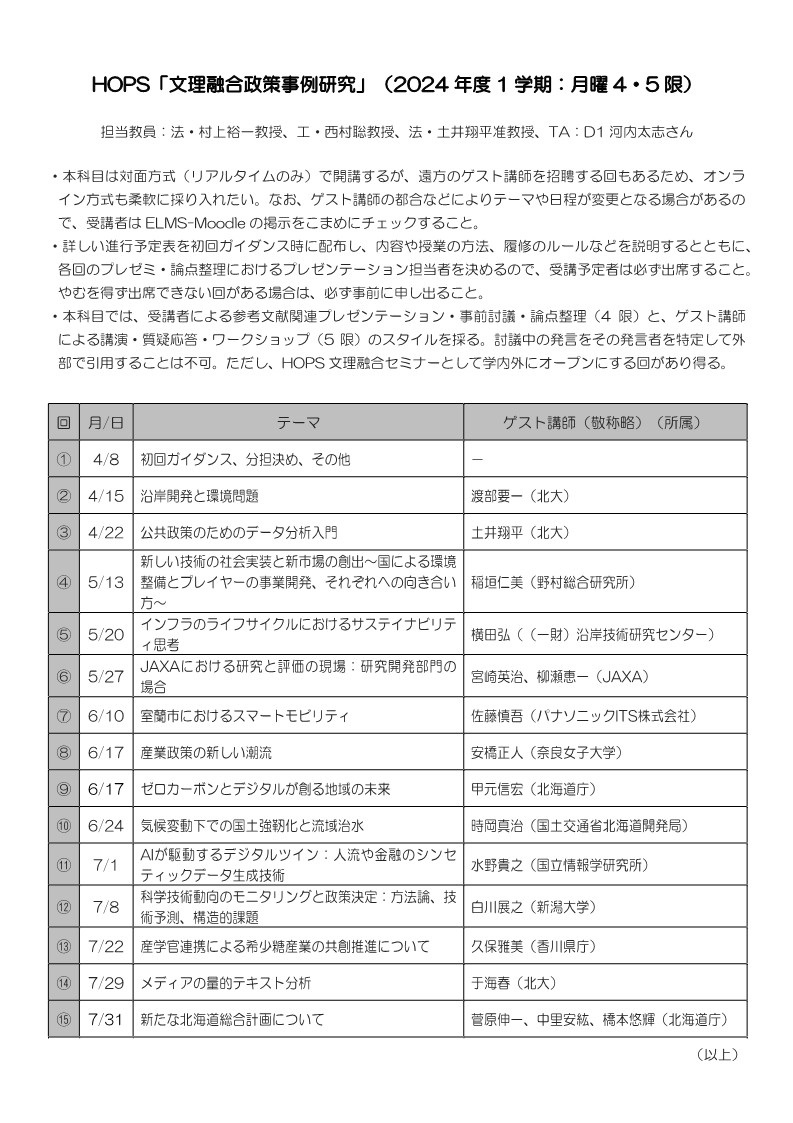 ● 準備学習(予習・復習)等の内容と分量
● 準備学習(予習・復習)等の内容と分量
1.受講者は、あらかじめ指定された論文・参考文献を読み、それに対する見解・疑問点をまとめた上で授業に臨むことが求められる。割り当てられた回では担当者がプレゼンテーションを行う。
2.受講者は、教室でのディスカッションに参加し、ゲストスピーカーの講義を聞き、Q&Aやワークショップにも積極的に取り組むことが求められる。
3.受講者は、毎回の講演内容と自説をまとめた小レポートと、政策課題を深掘りし、自説を明快かつ論理的に展開した最終レポートを提出することが求められる。
● 成績評価の基準と方法
・ 授業(プレゼンテーション、ディスカッション、ワークショップなど)への取組と中間・最終レポートの出来によって、総合的に成績評価を行う。授業に積極的に参加するとともに、本科目で取り上げたテーマに関する中間・最終レポートを期限までに提出することが単位取得の要件となる。
・ レポート作成に際しては、関連する論文・資料にアクセスしテーマについて深掘りするとともに、自説を明快かつ論理的に展開することが期待される。
・ 単位認定に関する評価基準は以下の通り。
1.事例として取り上げた先進的な文理融合政策の現状を理解している…可
2.1に加え、文理融合政策の近年の動向についても理解し、説明できる…良
3.2に加え、文理融合政策を的確に分析・評価し、自説を添えて説明できる…優
4.3のレベルが特に優れている…秀
● テキスト・教科書
本演習の内容を網羅するテキスト・教科書はない。参考文献のリストは授業の中で配付する。
● 講義指定図書
参考文献のリストは授業の中で配付する。
● 参照ホームページ
https://www.hops.hokudai.ac.jp/education/case-studies/
https://www.hops.hokudai.ac.jp/research/
https://lex.juris.hokudai.ac.jp/~yuichim/education2024.html#link1
●研究室のホームページ Websites
・https://www.eng.hokudai.ac.jp/labo/soilmech/nishimura/index.html
・http://lex.juris.hokudai.ac.jp/~yuichim/
・https://shohei-doi.github.io/
● 備考
(1) 招聘するゲストスピーカー等の都合によりテーマや日程が変更となる可能性がある。また、リアルタイムのオンライン講義を活用することもあり得るので、直前の掲示等に注意すること。
(2) 本科目開講時に詳しい進行予定表を配布し、内容や授業の方法、履修のルールを説明するとともに、各回のプレゼンテーション担当者を決めるので、受講予定者は必ず出席すること。
(3) やむを得ず出席できない回がある場合は、必ず事前に申し出ること。
[English Version]
* Co-offered with Professor Dr. Satoshi Nishimura and Dr. Shohei Doi
● Key Words
STI (Science, Technology, and Innovation), public policy, policy-making, policy implementation, policy evaluation, governance, basic/standard plan, technology/risk assessment, risk management, risk communication, regulatory policy, public utility, international standardisation, infrastructure management, environmental issues
● Course Objectives
The Hokkaido University Public Policy School (HOPS) was established in 2005 through a collaboration among the law, economy, and engineering faculties. Guided by its foundational principle of integrating Humanities/Social Sciences and Science/Technology, HOPS recommends that all its students take the Case Study course as a preliminary step before progressing to other courses. Notably, HOPS' methodical interdisciplinary approach to science, technology, and innovation (STI) policy distinguishes it from other public policy graduate schools in Japan.
This course serves as a platform for students to develop the essential expertise and competence needed to tackle public policy challenges. It achieves this through guest practitioner lectures and subsequent workshops, fostering interaction among students. Additionally, the course endeavors to impart understanding about the reciprocal relationship between STI and public policy, examining both perspectives: STI for public policy and vice versa.
Students are strongly encouraged to participate in this course voluntarily, given its substantial connection to general public policy theory and agendas. Its overarching aim is to provide comprehensive and practical knowledge for addressing various public policy issues. This is accomplished by bridging the gap between the social/natural sciences and humanities, integrating their modes of thinking, and harnessing their synergy.
● Course Goals
(1) Gain an understanding of current policy issues cutting across the realms of social/natural sciences and humanities, facilitated through practitioner and researcher-led lectures, interactive Q&A sessions, and subsequent discussions and workshops.
(2) Acquire knowledge and perspectives that integrate the social/natural sciences and humanities, essential for shaping and executing public policies, and comprehend their practical application in resolving complex policy matters.
(3) Develop the capacity for independent and pragmatic thinking concerning policy challenges, cultivating feasible solutions that encompass the integration of social/natural sciences and humanities.
● Course Schedule
In the Case Study course, students will engage in discussing a selected policy theme that integrates the social/natural sciences and humanities during the 1st period, followed by sessions with guest practitioners, researchers' lectures, Q&A segments, and workshops in the subsequent 2nd period. Refer to the following website for information regarding invited guests from past years. Some parts of the lecture might be conducted as a HOPS seminar.
HOPS has designed an integrated and cohesive education/research program to advance and enrich our interdisciplinary approach to public policy. This Case Study course is an integral component of this program, closely linked to the fundamental Technology Policy course.
Students are mandated to actively participate in the aforementioned program and continue their efforts in other courses, seminars, and their final project, the Research Paper. This program aims to equip students with comprehensive, interdisciplinary, and systematic expertise and competence.
● Homework
Students must attend all classes, comprehend the lecture content, and actively engage in critical discussions. Additionally, students may be requested to:
(1) Review the study material before each class and deliver classroom presentations.
(2) Participate in class discussions, respond to lectures, and actively participate in workshops.
(3) Prepare mid-term or final reports, facilitating professors' assessment of students' accomplishments.
Diligent effort and active participation are expected from all students.
● Grading System
The grading criteria for mid-term/final reports, participation in discussions, class presentations, and other assigned tasks are outlined as follows:
[C] - Students demonstrating a certified understanding of the current status of the discussed policy issues.
[B] - Students proficient in explaining current policies based on the framework presented in lectures and discussions.
[A] - Students adept at proficiently assessing and analyzing the current discussed policies.
[S] - Students who excel exceptionally in performing the tasks mentioned above and exhibit an outstanding mastery of the subject matter.
● Textbooks
References and a reading list will be provided during class.
● Reading List
References and a reading list will be provided during class.
●参照ホームページ Websites
・https://www.eng.hokudai.ac.jp/labo/soilmech/nishimura/index.html
・https://lex.juris.hokudai.ac.jp/~yuichim/education2024.html#link1
・https://shohei-doi.github.io/
●研究室のホームページ Websites
・https://www.eng.hokudai.ac.jp/labo/soilmech/nishimura/index.html
・http://lex.juris.hokudai.ac.jp/~yuichim/
・https://shohei-doi.github.io/
● Additional Information
(1) Kindly note that discussion topics and the schedule are subject to change due to unforeseen circumstances. Real-time online lectures might occasionally be incorporated.
(2) The detailed schedule and additional information will be provided at the start of the class. Students are requested to attend the initial meeting, during which each presentation will be allocated.
(3) If unable to attend a class, please notify the professor in advance. Nevertheless, students are urged to remain vigilant for any short notices or updates.

Toyota Automobile Museum (Feb. 2024)
2.法学部「行政学」(1学期:火4・金2) ※ 文学部「政治学(行政学)」と合併
●キーワード Key Words
・官僚制、行政制度、行政組織、行政活動、公共政策
●授業の目標 Course Objectives
・現代国家における行政の構造と機能について、様々な行政の制度、行政官僚制の特質、そして行政活動のメカニズムに焦点を当てつつ、意思決定論・組織管理論・政策分析論等の観点から考察する。
・政策の立案・執行・評価の各局面において生ずる課題、及び政策の実現を左右する要因についても検討する。
●到達目標 Course Goals
(1) 行政(学)の基礎と全体像を、その過去・現在・未来、制度・組織・活動の観点から、理論的・実践的に理解し捉えることができる。
(2) 現代日本の行政の特質を、歴史的な観点や国際比較の観点から捉えることができる。
(3) 現代行政の課題とその解決の方向性について、主体的かつ現実的に考えることができる。
●授業計画 Course Schedule
行政学は、現代国家における行政の構造と機能について、行政を構成する3要素、すなわち、
①国民からの付託により行政組織が位置付けられ、活動の前提となる枠組みを形作っている「制度」、
②行政活動を行う主体である「組織」、
③行政機関が国民に対して何らかの働きかけを行う「活動」
という観点から体系的に研究する分野である。
本講義では、行政(学)の過去・現在・未来を、その制度・組織・活動という3つの観点から体系的に検討する。構成(案)は下記の通り。
序 章 はじめに
(1) 行政(学)とは何か
(2) 行政分析の方法・枠組み
(3) 行政(学)の歴史
第1章 制度論
(1) 政府の仕組み
(2) 政府間関係-国際・国内
(3) 立法・司法等との関係
第2章 組織論
(1) 官僚制論・公務員制度
(2) 行政組織・管理論
(3) 行政改革
第3章 活動論
(1) 政策過程
(2) 行政と社会の相互作用
(3) 行政の統制と責任
終 章 おわりに
(1) 本講義のまとめ
(2) 行政(学)の展望
(3) その他
なお、本講義は4学期制対応科目として開講する。また、法曹を目指す方にも有益な講義にしたい。
●準備学習(予習・復習)等の内容と分量 Homework
・予習すべき参考文献等を指定する場合もあるが、基本的には、講義に出席ししっかりとノートをとって行政学を習得してもらいたい。
・定期試験では、①講義内容をきちんと理解できているか、②それを受けて行政(学)に興味を持ち、③自分なりに考えを深められているかを確認する予定である。
・なお、任意のレポート提出を受け付け、平常点に加味する場合がある。
●成績評価の基準と方法 Grading System
・定期試験の成績を基本としつつ、平常点を加味して評価する。
・おおよその成績評価基準は以下の通り。
1.講義で取り上げた行政(学)の現状を理解している…[C]–[C+]
2.1に加え、行政(学)の近年の動向についても理解し、説明できる…[B–]–[B]
3.2に加え、行政(学)を的確に分析・評価し、自説を添えて説明できる…[B+]–[A–]
4.3のレベルが特に優れている…[A]–[A+]
●テキスト・教科書 Textbooks
・講義はレジュメ等の配布資料に沿って進めていく予定。詳細は初回講義でアナウンスする。講義の中で参考文献を適宜紹介する。
●講義指定図書 Reading List
・新版 現代の行政〔第2版〕 / 森田朗 : 第一法規, 2022, ISBN:9784474077003
これは参考文献の単なる一例に過ぎない。他の参考文献は講義の中で適宜紹介する。
●参照ホームページ Websites
・ http://lex.juris.hokudai.ac.jp/~yuichim/education2024.html#link2
●研究室のホームページ Websites
・ http://lex.juris.hokudai.ac.jp/~yuichim/
●備考 Additional Information
・本講義では、都合によりオンラインに切り替わる回がありうるため、直前の掲示等に注意すること。
・オンライン講義で生じ得る様々な不足点は、講義指定図書などを併行して読むことで、補うことをお勧めする。
・本講義の成績評価は、学期末試験の結果を基に行う予定(詳細は初回に案内する)。質問は yuichim (at) juris.hokudai.ac.jp にて受け付ける。
[English Version]
●Key Words
・Bureaucracy, governmental system, organisation, activities, public policy
●Course Objectives
(1) To investigate the structure and functions of modern government and public administration (PA) from viewpoints of decision making, organisational management, and policy analysis, focusing on various institutions in the governmental system, administrative bureaucracy, and policy implementation mechanisms.
(2) To analyse theoretical and practical issues emerging during each policy life stage, such as agenda setting, policy designing, decision making, implementation, and assessment, and to identify factors that determine each policy’s output and outcomes.
●Course Goals
(1) To grasp the background and overview of PA (science) – based on its past, present, and future – from the perspectives of the governmental system, organisation, and activities.
(2) To construct a historical and comparative framework and thereby identify the characteristics of modern government and public administration with the purpose of relativising it.
(3) To obtain the theoretical and practical knowledge necessary to work by themselves on problems and find feasible solutions.
●Course Schedule
PA science, which takes a theoretical and systematic approach to the structure and functions of modern government, consists of three factors:
(1) the governmental system, which places governmental organisations and personnel after they are delegated by the public and that forms the structural proposition for governmental activities;
(2) the governmental organisation, which acts for policy implementation; and
(3) governmental activities, which work with the public in some way.
My lectures discuss the past, present, and the future of PA (science) systematically from the above-mentioned viewpoints. The contents are planned as follows:
Introduction
Section 1. What is PA (Science)?
Section 2. Methods and Frameworks for PA Analysis
Section 3. History of PA (Science)
Chapter 1. Governmental System
Section 1. The Governmental System’s Structure
Section 2. Inter-Governmental Relations
Section 3. Relations with Parliament and Courts
Chapter 2. Governmental Organisation
Section 1. Bureaucracy and the Personnel System
Section 2. Organisational Theory and Management
Section 3. Administrative Reform
Chapter 3. Governmental Activities
Section 1. Policy Process: Life Stages
Section 2. Interactions between Government and Society
Section 3. Government Control and Responsibility
Final Chapter
Section 1. Wrap Up
Section 2. Prospect for the Future: Beyond Governance
Section 3. Appendix for End-of-Term Exam
I aim to provide a meaningful lecture, even for those students who major in law. This lecture can be provided in the first and second halves of the semester.
●Homework
(1) Students are required to attend every class and take notes so that they may come to grasp the background and overview of PA. A reading list will be offered for their preparation and review prior to my lectures.
(2) The end-of-term exam questions whether students (a) understood my lectures, (b) are interested in PA and the related phenomena, and (c) have deepened their thinking based on the knowledge they obtained about PA theory and practice.
(3) An individual project and report on my lectures are appreciated, and they can be additionally graded.
●Grading System
(1) Grading will be based on the end-of-term examination (100%).
(2) An approximate grading system is as follows:
[C]–[C+]: students certified to have understood the current situation of the lectured public administration (science),
[B–]–[B]: students able to explain the current public administration (science) based on the lectured framework,
[B+]–[A–]: students able to assess and analyse the current lectured public administration (science) proficiently,
[A]–[A+]: students who performed the tasks mentioned above exceptionally well.
●Textbooks
My lectures are conducted based on my outline paper, which is handed out at the beginning of every class and within which the contents of various textbooks are reflected. A reference and reading list will be offered in class.
●Reading List
・Morita, A. (2022). Modern Public Administration (2nd edition). Daiichi Houki. ISBN: 9784474077003
These are just examples of the references. Other references and a reading list will be offered in class.
●Websites
・http://lex.juris.hokudai.ac.jp/~yuichim/education2024.html#link2
●Website of Laboratory
・http://lex.juris.hokudai.ac.jp/~yuichim/
●Additional Information
・This lecture might sometimes be offered on the Internet. Students are asked to pay attention to short notices. Students of English speakers are asked to email me, the instructor ( yuichim (at) juris.hokudai.ac.jp ), for further information.

The Limited Express Suzuran at Higashi-Muroran Station (Jan. 2024)
3.法学部「演習Ⅰ」(1学期:水5)
●キーワード Key Words
・フランス、官僚制、行政制度、行政組織、行政活動、公共政策
●授業の目標 Course Objectives
フランス語テクストの講読を通して、フランスの行政、政治、社会について知り、深く考える。
●到達目標 Course Goals
フランス語の読解力と、フランスの行政、政治、社会についての知識を獲得し、深く考える。
●授業計画 Course Schedule
本演習では、フランスの行政、政治、社会に関するテクスト(例:Pinson, G. (2020). La ville néolibérale. Presses Universitaires de France.)を輪読する。テクストは、受講者とも相談しつつ決定する。毎回担当者が仏文和訳と論点提示をし、それに関して受講者全員でディスカッションをする。
その上で、受講者が、テクストの内容を参考にしつつ独自のフランス研究に取り組む。最終的には各自の研究の成果を簡単なレポートにまとめ、期限内に提出することを求める。
本演習を通して、フランス語の読解力やフランスの行政、政治、社会に関する知見のみならず、自ら課題を発見してディスカッションし、自ら研究しその成果を表現する能力を会得できよう。
●準備学習(予習・復習)等の内容と分量 Homework
まずは①自分の担当箇所の仏文和訳と論点提示、②毎回のディスカッションへの参加、及び、③簡単な最終レポートの提出を求めるので、それに付随する予習・復習が必要となる。
●成績評価の基準と方法 Grading System
・ 演習への取組(仏文和訳の出来(35%)、議論への参加度(45%))と最終レポートの出来(20%)によって、総合的に成績評価を行う。演習に積極的に参加するとともに、本演習で取り上げたテーマに関する最終レポートを期限までに提出することが単位取得の要件となる。
・ 単位認定に関する評価基準は以下の通り。
[C]–[C+]: 演習で取り上げたテクストの内容を正確に理解している
[B–]–[B]: 上記のことに加え、フランスの近年の動向についても理解し、説明できる
[B+]–[A–]: 上記のことに加え、フランスの現状を的確に分析・評価し、自説を添えて説明できる
[A]–[A+]: 上記のことのレベルが特に優れている
●テキスト・教科書 Textbooks
・参考文献は演習の中で適宜紹介する。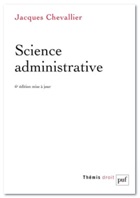
●講義指定図書 Reading List
・Pour écrire en franc̦ais / 松村剛 : 朝日出版社, 2001, ISBN:4255351341
・フランスの政治制度〔改訂版〕 / 大山礼子 : 東信堂, 2013, ISBN:4798911941
・フランス法〔第5版〕 / 滝沢正 : 三省堂, 2018, ISBN:4385323038
・参考文献は演習の中で適宜紹介する。
●参照ホームページ Websites
・http://lex.juris.hokudai.ac.jp/~yuichim/education2024.html#link3
●備 考
・本演習に係る資料配布に当たっては、ELMSなども活用する予定。
・やむを得ず出席できない回がある場合は、必ず事前に申し出ること。
・都合によりオンライン開講に切り替わる回もありうるので、直前の掲示等に注意すること。
[English Version]
●Key Words
・France, bureaucracy, governmental system, organisation, activities, public policy
●Course Objectives
・To read French texts in order to understand and reflect on public administration, politics, and society of France.
●Course Goals
・To improve French reading skill, and to learn about public administration, politics, and society of France.
●Course Schedule
Participants are required firstly to read and translate French texts on public administration, politics, and society of France (e.g. Pinson, G. (2020). La ville néolibérale. Presses Universitaires de France.). French texts are to be recommended by the professor on the first day. A coordinator, or participant in charge, translate assigned texts and introduces some related literature. Participants then discuss theoretical and practical issues provided by the coordinator critically and productively.
Participants secondly work on their own research projects, referring to the texts and other previous studies. Participants are ultimately required to write a short thesis based on their projects, and send it to the professor before the announced deadline.
This exercise will help participants to acquire basic French reading skill, knowledge on France, and to find out important theoretical issues, investigate them and present their findings to others effectively.
●Homework
・Participants are asked (1) to translate assigned texts and provide agendas to be discussed in class, (2) to participate in each discussion, and (3) to write a short thesis. The accompanying preparations and reviews are necessary.
●Grading System
(1) Grading will be based on (a) translation quality (35%), (b) class participation (45%), and (c) writing assignment (20%).
(2) The translation in class, participation in discussions, and final report, are graded as follows:
[C]–[C+]: students certified to have understood the text,
[B–]–[B]: students able to explain the current situation in France based on the discussed framework,
[B+]–[A–]: students able to assess and analyse the current discussed situation proficiently,
[A]–[A+]: students who performed the tasks mentioned above exceptionally well.
●Textbooks
・References and a reading list will be offered in class.
●Reading List
・Pour écrire en franc̦ais / 松村剛 : 朝日出版社, 2001, ISBN:4255351341
・フランスの政治制度〔改訂版〕 / 大山礼子 : 東信堂, 2013, ISBN:4798911941
・フランス法〔第5版〕 / 滝沢正 : 三省堂, 2018, ISBN:4385323038
・References and a reading list will be offered in class.
●Reference Websites
・http://lex.juris.hokudai.ac.jp/~yuichim/education2024.html#link3
●Additional Information
(1) ELMS will be used to share related materials to the class.
(2) Be sure to tell the professor in advance when you have to be absent from class.
(3) Students are asked to pay attention to short notices because this course might sometimes be offered online.
●Mots clés
・France, bureaucratie, système gouvernemental, organisation, activités, politiques publiques
●Objectifs du cours
・Lire des textes français afin de comprendre et de réfléchir sur l'administration publique, la politique et la société françaises.
・Améliorer les compétences de lecture en français et s'informer sur l'administration publique, la politique et la société françaises.
●Programme du cours
Les participants doivent tout d'abord lire et traduire des textes français sur l'administration publique, la politique et la société française (par exemple, Pinson, G. (2020). La ville néolibérale. Presses Universitaires de France.). Les textes français seront recommandés par le professeur à la première séance. Un coordinateur, ou un participant responsable, traduit les textes assignés et présente des ouvrages connexes. Les participants discutent ensuite de manière critique et productive des questions théoriques et pratiques soulevées par le coordinateur.
Les participants travaillent ensuite sur leurs propres projets de recherche, en se référant aux textes et à d'autres études antérieures. Les participants doivent finalement rédiger une courte thèse basée sur leurs projets et l'envoyer au professeur avant la date limite annoncée.
Cet exercice aidera les participants à acquérir des compétences de base en lecture en français, des connaissances sur la France, et à trouver des questions théoriques importantes, à les étudier et à présenter leurs résultats aux autres de manière efficace.
●Devoirs
・Les participants est demandé (1) de traduire les textes assignés et de fournir les ordres du jour à discuter en classe, (2) de participer à chaque discussion, et (3) de rédiger une courte thèse. Les préparations et révisions qui l'accompagnent sont nécessaires.
●Système de notation
(1) La notation sera basée sur (a) la qualité de la traduction (35%), (b) la participation en classe (45%), et (c) le travail de rédaction (20%).
(2) La traduction en classe, la participation aux discussions et le rapport final sont notés comme suit:
[C]-[C+] : les étudiants certifient avoir compris le texte,
[B-]-[B] : étudiants capables d'expliquer la situation actuelle en France sur la base du cadre discuté,
[B+]-[A-] : étudiants capables d'évaluer et d'analyser la situation actuelle discutée avec compétence,
[A]-[A+] : étudiants ayant réalisé les tâches mentionnées ci-dessus de manière exceptionnelle.
●Les manuels
・Des références et une liste de lecture seront proposées en classe.
●Liste de lecture
・Pour écrire en franc̦ais / 松村剛 : 朝日出版社, 2001, ISBN:4255351341
・フランスの政治制度〔改訂版〕 / 大山礼子 : 東信堂, 2013, ISBN:4798911941
・フランス法〔第5版〕 / 滝沢正 : 三省堂, 2018, ISBN:4385323038
・Des références et une liste de lecture seront proposées en classe.
●Sites web de référence
・http://lex.juris.hokudai.ac.jp/~yuichim/education2024.html#link3
●Informations complémentaires
(1) ELMS sera utilisé pour partager des documents connexes avec la classe.
(2) Veillez à prévenir le professeur à l'avance si vous devez vous absenter de la classe.
(3) Les étudiants sont priés de prêter attention aux courtes annonces car ce cours pourrait parfois être proposé en ligne.

The Juraku-en Daibutsu (Great Buddha) at Tokai (Feb. 2024)
4.大学院法学研究科「政治学総合演習Ⅰ」・「政治学総合研究Ⅰ」(1学期:金5、2学期:木5)
●キーワード Key Words
・政治研究会、政治学、現代政治分析、比較政治、行政学、行財政論、地方自治論、国際政治、国際政治経済学、アジア政治史、ヨーロッパ政治史、アメリカ政治史、日本政治史、西洋政治思想史、日本政治思想史
●授業の目標 Course Objectives
・広義の政治学(狭義の政治学(政治理論、比較政治)、行政学(行財政、地方自治論)、国際政治、政治史、政治思想史)に関する優れた研究に触れ、知的刺激を受けるとともに、知見を広げ、自身の研究遂行の一助とする。
●到達目標 Course Goals
(1) 広義の政治学界の最前線で研究をしている方々から報告をいただき、質疑応答を通じて知的力量の向上を図る。
(2) 北海道の大学・研究機関・行政などで広義の政治学を学ぶ方々との情報交換を通して、学問的交流の場とする。
(3) 広義の政治学の各分野の研究動向を知り、分析視角や発表技術などを習得する。
●授業計画 Course Schedule
政治研究会は、原則として月1回、夏学期は金曜夕方に、冬学期は木曜夕方に、それぞれ開催される。
研究会には学内外から優れた研究者を招聘し、研究報告をしていただく。受講者には、質疑応答に積極的に参加することが期待される。
研究会情報は、法学部棟1階の掲示板や同6階の法学部教育研究支援センター・政治部門前に掲示されるので、各自必ず確認すること。不明点は担当教員、もしくは、法学部教育研究支援センター・政治部門(seiji (at) juris.hokudai.ac.jp)に問い合わせること。
●招聘した報告者(※ 所属は当時のもの)
1-1.2024/04/26:前田 亮介氏(北海道大学)「金融・帝国・戦争-日本の対外膨張過程のなかの満洲・華北国際化構想、1932-1939」
1-2.2024/05/10:佐々田 博教氏(北海道大学)「農政トライアングルの誕生:自己組織化する利益誘導構造」
1-3.2024/06/14(特別研究会):Dr. Dorota Szelewa(University College Dublin)“Right-wing populism, gender and family policy discourses in Hungary and Poland”
1-4.2024/07/05:山中 仁吉氏(北海道大学)「女性参政権運動の政治史-初期議会から「憲政の常道」まで、1890~1932」
1-5.2024/07/19:山口 二郎氏(法政大学)〔コメンテーター:中村 督氏(北海道大学)〕「政治改革の30年を振り返る」
2-1.2024/10/17:五十嵐 元道氏(関西大学)「国際刑事裁判におけるデジタル証拠のエコシステムに関する一考察 」
2-2.2024/12/12:秋元 真吾氏(フランス国立科学研究センター)「ジャン・ボダンと人文主義期フランスにおける統治階層の知的基盤の再構築」
2-3.2024/12/26:梅澤 佑介氏(関東学院大学)「市民の義務としての〈反乱〉」
2-4.2025/01/29(野村真紀先生メモリアル・レクチャー):村木 数鷹氏(東京大学)「マキャヴェッリアン・パラドックス:歴史的範例を扱う新たな方法論と近代政治学の誕生」
●準備学習(予習・復習)等の内容と分量 Homework
招聘する報告者の著作や参考文献に事前に目を通しておくことで、より有意義な研究会となる。受講者には最終レポートの提出を求める。
●成績評価の基準と方法 Grading System
・研究会への出席、参加、最終レポートの出来などにより評価する。詳しくは初回研究会にてアナウンスする。単位認定に関する評価基準は以下の通り。
1.研究会で取り上げたテーマについて理解している…可
2.1に加え、広義の政治学研究の近年の動向についても理解し、説明できる…良
3.2に加え、広義の政治学研究について的確に分析・評価し、自説を添えて説明できる…優
4.3のレベルが特に優れている…秀
●テキスト・教科書 Textbooks
参考文献は研究会の中で告知・配付する。
●講義指定図書 Reading List
参考文献は研究会の中で告知・配付する。
●参照ホームページ Websites
・https://www.juris.hokudai.ac.jp/general/research/kenkyuukai.html#sct12
・https://lex.juris.hokudai.ac.jp/~yuichim/education2024.html#link4
●研究室のホームページ Website of Laboratory
・https://www.juris.hokudai.ac.jp/general/research/kenkyuukai.html#sct12
・https://lex.juris.hokudai.ac.jp/~yuichim/
●備 考
(1) 招聘する報告者の都合などにより、日程が変則的になる可能性がある。また、リアルタイムのオンライン・ミーティングを活用することもあるので、直前の掲示等に注意すること。
(2) 初回研究会にて顔合わせをし、研究会の内容や開催方法、履修のルールなどを説明するので、受講予定者は必ず出席すること。
(3) やむを得ず出席できない回がある場合は、必ず事前に申し出ること。
[English Version]
●Key Words
・Workshop on Political Science Studies, Political Theory, Contemporary Political Analysis, Comparative Politics, Public Administration and Finance, Local Autonomy, International Politics, International Political Economy, Asian Political History, European Political History, American Political History, Japanese Political History, History of Western Political Thought, History of Japanese Political Thought
●Course Objectives
・Students are expected to obtain a broader overview of current trends in political science research, by participating in this workshop with distinguished researchers.
●Course Goals
(1) To join lectures from researchers at the forefront of political science studies, and to brush up on intellectual abilities through question-and-answer sessions.
(2) To make this workshop a place for academic communication through the information exchange with researchers of political science in a broad sense at universities, research institutes, and governments, mainly in Hokkaido.
(3) To follow research trends in political science studies, and to obtain analytical perspectives and presentation techniques.
●Course Schedule
The Political Science Studies Workshop is planned once a month on Friday evenings during the summer term and on Thursday evenings during the winter term.
Distinguished researchers are invited to this workshop to offer lectures on their research. Graduate students are expected to participate proactively also in the question-and-answer sessions.
The workshop information will be posted on the bulletin board on the 1st floor of the Faculty of Law building and at the Political Department office of the Education and Research Support Center for the Faculty of Law on the 6th floor, so be sure to check them out. If you have any questions, please contact the organizer or the Political Department office of the Education and Research Support Center for the Faculty of Law (seiji (at) juris.hokudai.ac.jp).
●Homework
Students are encouraged to read works of guest speakers before participating the workshop. An individual final report is necessary to get graded.
●Grading System
The final report, attendance to workshop, and participation in discussions are graded as follows:
[C] students certified to have understood the current situation of discussed themes,
[B] students able to explain the current trends based on the lectured and discussed framework,
[A] students able to assess and analyse the current discussed themes proficiently,
[S] students who performed the tasks mentioned above exceptionally well.
●Textbooks
References and a reading list will be offered in workshops.
●Reading List
References and a reading list will be offered in workshops.
●Reference Websites
・https://www.juris.hokudai.ac.jp/general/research/kenkyuukai.html#sct12
・https://lex.juris.hokudai.ac.jp/~yuichim/education2024.html
●Website of Laboratory
・https://www.juris.hokudai.ac.jp/general/research/kenkyuukai.html#sct12
・https://lex.juris.hokudai.ac.jp/~yuichim/education2024.html#link4
●Additional Information
(1) Please note that the workshop schedule may change due to some reasons. Real-time online lectures may sometimes be used.
(2) The detailed information will be offered at the beginning of the workshop. Students are asked to join the first meeting.
(3) Please be sure to inform in advance in case you cannot attend. Anyway, students are asked to pay attention to short notices.

Asahiyama Zoo (Jan. 2024)
5.工学院(大学院共通科目)「科学技術政策特論」(1学期:金5)
※ 小崎完先生・齊藤大地先生ご担当のオムニバス講義(村上担当日は8月2日)
●キーワード Key Words
・科学技術政策、科学技術とイノベーション、産業政策と産業技術、農業政策と科学技術、情報通信政策、DX及びGX技術政策、医療政策、交通政策、環境政策と科学技術、地域科学技術、宇宙開発、原子力研究開発
●授業の目標 Course Objectives
・政府、地方自治体、政府関係機関が推進する科学技術政策について、政策課題解決の第一線で活躍する講師陣から学ぶことを通じて、科学技術政策への関心と洞察力を涵養する。
●到達目標 Course Goals
・政策の受益者・対象者としてだけではなく、政策の形成者・実施者としての考え方や物の見方をも理解した上で、卒業後に、自らの仕事や日々の生活の関連で科学技術が関わる課題について、適切に判断できる能力の獲得を目標とする。
●授業計画 Course Schedule
・非常勤講師として、それぞれの政策課題解決の第一線で活躍する各省庁、自治体、政府関係機関幹部職員等が講義を行う。
・社会の課題解決に向けた科学技術政策の現状と展望(15回)
・内閣府、文部科学省、農林水産省、環境省、経済産業省、政府関係機関、地方自治体、大学、経済団体、民間シンクタンク等で活躍する専門家から、それぞれの行政分野の課題と解決に向けた技術政策の関わりについて、現場の体験等に則し具体的に学ぶ。
・尚、令和6年度の本講義に関する詳しい内容は下記サイトを参照すること。https://www.ceed.eng.hokudai.ac.jp/lecture#listA
・予定している講義計画は以下の通り(調整中:順不同)
我が国の科学技術・イノベーション政策について 内閣府
我が国の宇宙政策の最新動向 内閣府
原子力分野研究開発施策について 文部科学省
大学発イノベーション施策と高等教育行政施策について 文部科学省
初等中等教育におけるDX振興施策について 文部科学省
「スマート農業」と「みどりの食料システム戦略」 農林水産省
食品安全行政とこれに必要な科学技術 農林水産省
カーボンニュートラルへの道筋と変化するエネルギー情勢 環境省
建築・地域・環境デザインの課題・方向 北海道立総合研究機構
北海道観光 未来への戦略 北海道科学大学
経済安全保障やスタートアップ振興に係る経済界の対応 21世紀政策研究所
予算面から考える日本の科学技術政策 北海道大学公共政策大学院教授
サイバーセキュリティ・DX技術等の振興 経済産業省
北海道におけるGX(脱炭素関連)や先端半導体、デジタル関連産業の振興 北海道庁
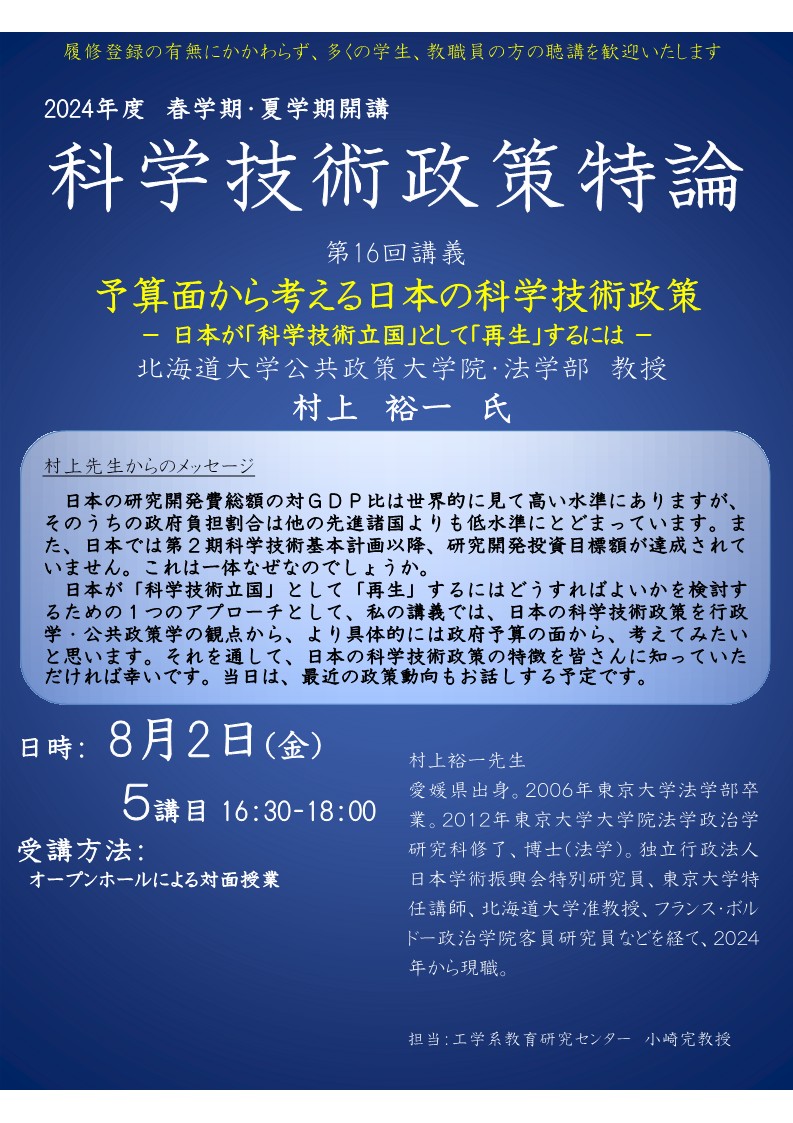
●準備学習(予習・復習)等の内容と分量 Homework
・学修効果を上げるため、各講義終了後に、取り扱われた政策課題の解決と科学技術政策との関連(課題含む)について概ね2時間を目安に自分なりの所見をまとめておくことが推奨される。
●成績評価の基準と方法 Grading System
・毎回講義終了後の感想レポート、一連の講義終了後に課す最終レポートによって評価する。
●テキスト・教科書 Textbooks
・指定テキストはなく、講義の度に必要に応じて配布するが、日常から社会におけるさまざまな分野の課題解決と科学技術政策との関係に注意を払って欲しい。
●参照ホームページ Websites
・https://www.ceed.eng.hokudai.ac.jp/lecture#listA
●備 考
・令和6年度の本講義の内容は下記サイトを参照すること。
--- https://www.ceed.eng.hokudai.ac.jp/lecture#listA
●村上担当回(8/2)の予定:「予算面から考える日本の科学技術政策」
日本の研究開発費総額の対GDP比は世界的に見て高い水準にありますが、そのうちの政府負担割合は他の先進諸国よりも低水準にとどまっています。また、日本では第2期科学技術基本計画以降、研究開発投資目標額が達成されていません。これは一体なぜなのでしょうか。日本が「科学技術立国」として「再生」するにはどうすればよいかを検討するための1つのアプローチとして、私の講義では、日本の科学技術政策を行政学・公共政策学の観点から、より具体的には政府予算の面から、考えてみたいと思います。それを通して、日本の科学技術政策の特徴を皆さんに知っていただければ幸いです。当日は、最近の政策動向もお話しする予定です。
[English Version]
※ Omnibus lecture in charge of Professor Dr. Tamotsu Kozaki and Associate Professor Daichi Saito
●Key Words
・Science and technology policy, Technology and innovation, Industrial policy and industrial technology, Agriculture policy, Information and communication policy, DX and GX technologies and policy, Medical policy, Transportation policy, Environmental policy, Local policy, Space development, Nuclear power research and development
●Course Objectives
・Learn the science and technology policy of the central and local governments from lectures by professional officers.
●Course Goals
・By understanding the process to determine the science and technology policy, gain ability that you can consider the issues on science and technology around you properly.
●Course Schedule
・Professional officers from the central and local governments, etc. give lectures on their special fields.
Current status and prospects of science and technology policies for solving social issues (15 times)
Through the lectures by experts working in the Cabinet Office, Ministry of Education, Culture, Sports, Science and Technology, Ministry of Agriculture, Forestry and Fisheries, Ministry of the Environment, Ministry of Economy, Trade and Industry, governmental organizations, local governments, universities, economic organization, private think tanks, etc., participants will learn science and technology policies for solving the issues in each administrative field.
・Please refer to the following web site for the contents of this course in 2024.
-- https://www.ceed.eng.hokudai.ac.jp/lecture#listA
●Homework
・To enhance learning effects, students should spend about two hours in summarizing their thoughts on the topics discussed in the lecture.
●Grading System
・Evaluation will be carried out by report on each lecture and the final report on the entire lecture.
●Textbooks
・No text book is specified and the materials used in the lectures will be given at each lecture. Students are expected to pay attention to the relationships between problem resolution in various fields and the policy of Science and Technology.
●Websites
・https://www.ceed.eng.hokudai.ac.jp/lecture#listA
●Additional Information
・Please refer to the following web site for the contents of this lecture in 2024.
-- https://www.ceed.eng.hokudai.ac.jp/lecture#listA

Japan Rail Hakodate Main Line (Jan. 2024)
6.公共政策大学院「技術政策学」(2学期:月2)
※ 西村聡先生・土井翔平先生と共同
●キーワード Key Words
科学技術・イノベーション、公共政策、政策決定、政策実施、政策評価、ガバナンス、基本計画、テクノロジー(リスク)・アセスメント、リスク・マネジメント、リスク・コミュニケーション、規制政策、公共事業、国際標準化、インフラ整備、兵器開発、環境問題、知的財産権、AI(人工知能)、ディープ・ラーニング(深層学習)
●授業の目標 Course Objectives
北海道大学公共政策大学院(HOPS)は、2005年に法学部・経済学部・工学部が共同で創設して以来、「文理融合」を理念の1つに掲げ、この「技術政策学」を前提科目に位置付けている。こうした学際的でシステマティックな「文理融合」への取り組みは、全国のどの公共政策大学院と比べてもかなり特徴的である。
本講義では、様々なバックグラウンドを持つ受講者(とりわけ1年次学生)において、科学技術と公共政策の関係を、「公共政策のための科学技術」と「科学技術のための公共政策」の両面から学び、公共政策上の問題解決に必要な専門性と実践力を獲得するための基盤を形成してもらうことを目標とする。
HOPSのカリキュラム上、本講義は「公共経営コース」と「国際政策コース」のみの選択必修科目となっている。しかしながら、本講義では公共政策の一般理論も話題にすることを予定しているほか、いわゆる「文系」的思考と「理系」的思考の相互作用を体感しながらそれらを可能な限り「融合」し、既存のディシプリンを超えて、公共政策上の様々な問題解決に必要な総合的・実践的な専門性を身に付けてもらうことを目標としている。したがって、すべてのHOPS生が本講義を積極的に受講することが期待される。
●到達目標 Course Goals
本講義では、「科学技術のための公共政策」、すなわち、科学技術を持続可能な形で発展・進化させていくための公共政策・規制政策とはどういったものかということと、「公共政策のための科学技術」、すなわち、社会問題の解決と公共政策に科学技術がどう作用・貢献し、あるいは活用されているかということとの両面から、科学技術と公共政策の関係について考察・理解する。
これを通して、受講者が、公共政策上の問題解決に必要な「文理融合」の総合的・体系的な専門性・理解力と思考様式(の基盤)を獲得することを到達目標とする。
●授業計画 Course Schedule
本講義では、まず総論として、上記の「科学技術のための公共政策」と「公共政策のための科学技術」の大枠を示した上で、科学技術と公共政策の一般理論、例えば、科学技術ガバナンスの制度・歴史・諸概念、科学技術の政策決定に影響する諸要因、技術革新が公共政策や社会・制度のあり方に与える変化の態様などについて、映像資料なども活用しながら、また、受講者間でディスカッションもしながら、検討する。
続いて、各担当教員が講じる具体的事例に基づいて、科学技術と公共政策の各論的な検討を進めていく。そこでは、例えば、インフラ整備の公共政策論上の課題、科学技術と安全保障の交錯状況、環境問題と知的財産権をめぐる国際政治経済、情報技術やAIの利用と社会的課題などがテーマとなる(詳細な進行表は講義初回に配布する)。
なお、HOPSでは、その「文理融合」の取り組みをいっそう深化させるべく、通常並列的に取り扱われ、議論が拡散しがちで多岐に渡るテーマをある程度一貫性のある形で展開していくための教育・研究プログラムを設けている。これは、いわば座学としての本講義を補完する。HOPS生には、本講義受講後に上記プログラムにも積極的に参加するとともに、本講義で学んだことを他の関連科目(「公共経営特論」、各種「事例研究」など)やリサーチペーパーの執筆(「公共政策特別研究」)にも活かすことで、公共政策上の問題解決に必要な「文理融合」の総合的・体系的な専門性と思考様式を獲得することが期待される。
●準備学習(予習・復習)等の内容と分量 Homework
基本的には、毎回講義に出席してその内容を理解し、教室でのディスカッションにも積極的に参加することが求められる。場合によっては、
①各担当教員が提示する資料等を通読し予習しておくこと、
②講義内容を踏まえてレスポンス・ペーパーを提出したり、それを教室で発表したりすること、
③講義内容の理解度確認などを目的に中間・最終レポートを提出すること、
を求めることがあり得、それ相応の予習・復習が必要となる。
●成績評価の基準と方法 Grading System
各担当教員が提示する課題(中間・最終レポート、ディスカッション、プレゼンテーションなど)の出来に基づき、成績評価を行う。その基準の目安は下記の通り。
① 本講義の内容を理解している・・・可
② ①について、具体的事例にあてはめて一応の説明ができる・・・良
③ ②について、的確なテクノロジー・アセスメント、政策分析ができる・・・優
④ ③について、特に優れた成果が認められる・・・秀
●テキスト・教科書 Textbooks
参考文献は講義の中で適宜紹介する。
●講義指定図書 Reading List
参考文献は講義の中で適宜紹介する。
●参照ホームページ Websites
・https://www.eng.hokudai.ac.jp/labo/soilmech/nishimura/index.html
・https://lex.juris.hokudai.ac.jp/~yuichim/education2024.html#link6
・https://shohei-doi.github.io/
●研究室のホームページ Websites
・https://www.eng.hokudai.ac.jp/labo/soilmech/nishimura/index.html
・http://lex.juris.hokudai.ac.jp/~yuichim/
・https://shohei-doi.github.io/
●備考 Additional Information
対面授業だが、都合によりオンラインになる回があり得るので、直前の掲示等に注意すること。
[English Version]
* Co-offered with Professor Dr. Satoshi Nishimura and Dr. Shohei Doi
●Key Words
STI (Science, Technology, and Innovation), public policy, policy-making, policy implementation, policy evaluation, governance, basic/standard plan, technology/risk assessment, risk management, risk communication, regulatory policy, public utility, international standardisation, infrastructure management, arms race, environmental issues, intellectual property rights, artificial intelligence, deep learning
●Course Objectives
The Hokkaido University Public Policy School (HOPS) was established in 2005 through collaboration among the law, economy, and engineering faculties. Guided by the founding principle of "Integration of Humanities/Social-Sciences and Science/Technology," HOPS advocates for all incoming students to undertake the Technology Policy course as a prerequisite before pursuing other specialized courses. Notably, HOPS takes a distinctive systematic interdisciplinary approach toward science, technology, and innovation (STI) policy, setting it apart from other public policy graduate schools in Japan.
This course serves as a foundation for students from diverse backgrounds, providing essential expertise and skills to address public policy challenges. Moreover, its objective is to impart understanding about the interconnection between STI and public policy, considering both perspectives — STI's role in public policy and vice versa.
While formally compulsory for students enrolled in the public management and international policy courses, participation is also encouraged for students from other disciplines. The course begins with a lecture encompassing general public policy theory and agendas. Its overarching aim is to furnish comprehensive and practical knowledge essential for resolving various public policy issues. This is achieved by bridging the gap between the arts and science disciplines, merging their modes of thought, and harnessing their synergies.
●Course Goals
This course comprises two primary sections. The initial segment, "Public Policy for STI," explores the existing policies and regulations aimed at fostering sustainable Science, Technology, and Innovation (STI) and contemplates the ideal trajectory for its development. The subsequent part, "STI for Public Policy," delves into the role of STI in society, its contributions, and its application in addressing societal challenges and public policy issues.
By engaging in this course, students will acquire comprehensive and systematic expertise, knowledge, and competence. These elements lay the groundwork for resolving public policy challenges by fostering interdisciplinary thinking and understanding.
●Course Schedule
As an initial overview of the course, introductory lectures will cover the foundational theories encompassing Science, Technology, and Innovation (STI) and public policy. This will include an outline or framework discussing the interrelationship between "public policy for STI" and "STI for public policy." Participants will engage in discussions and exchange opinions, either during lectures or after viewing audio-visual materials, focusing on themes such as the structural components, institutional dynamics, and historical evolution of STI governance. Additionally, discussions will explore factors influencing STI policy-making and the societal and political transformations induced by STI.
Following this, the course will progress to examine specific agendas or case studies related to STI and public policy. Discussions will encompass diverse subjects, including infrastructure development in connection with public policy, the intersection of STI and international security, the political economy surrounding environmental issues and intellectual property rights, as well as the societal implications arising from emerging information technologies and artificial intelligence. A detailed schedule for these discussions will be provided on the first day of the course.
HOPS has devised an integrated and cohesive educational and research program to advance and deepen our interdisciplinary approach to public policy. This program extends beyond classroom lectures and encourages active participation in various activities such as the Technology Policy course. Students are required to engage in this program and sustain their efforts in other courses and seminars, including the Public Management Special Lecture, diverse Policy Case Studies, and their final project, the Research Paper. This comprehensive program aims to equip students with interdisciplinary, systematic expertise, fostering the acquisition of comprehensive competence in the field.
●Homework
Students must attend all classes, comprehend the lecture content, and actively engage in critical discussions. Additionally, students may be requested to:
(1) Review the assigned study material before attending each class.
(2) Participate in discussions, respond to lectures, and deliver classroom presentations.
(3) Prepare mid-term or final reports to demonstrate their comprehension of the lectures, aiding professors in assessing their understanding.
Diligent effort and active participation are anticipated from all students.
●Grading System
The grading criteria for mid-term/final reports, participation in discussions, class presentations, and other assigned tasks are as follows:
[C] - Students demonstrating a certified understanding of the lecture content.
[B] - Students proficient in explaining the current Science, Technology, and Innovation (STI) policy based on the provided framework.
[A] - Students capable of proficiently assessing and analyzing the current STI policy.
[S] - Students who excel exceptionally in performing the aforementioned tasks and exhibit an outstanding mastery of the subject matter.
●Textbooks
References and a reading list will be provided during class.
●Reading List
References and a reading list will be provided during class.
●Websites
・https://www.eng.hokudai.ac.jp/labo/soilmech/nishimura/index.html
・https://lex.juris.hokudai.ac.jp/~yuichim/education2024.html#link6
・https://shohei-doi.github.io/
●Website of Laboratory
・https://www.eng.hokudai.ac.jp/labo/soilmech/nishimura/index.html
・http://lex.juris.hokudai.ac.jp/~yuichim/
・https://shohei-doi.github.io/
●Additional Information
Students are kindly requested to remain attentive to brief notices as this course may sometimes transition to an online format due to unforeseen circumstances.

Night in Asahikawa (Jan. 2024)
7.法学部「演習Ⅰ」(2学期:火4)
●キーワード Key Words
・官僚制、行政制度、行政組織、行政活動、公共政策
●授業の目標 Course Objectives
・行政学や政治学に関する比較的新しい文献を読み、独自の行政学研究に取り組む。
●到達目標 Course Goals
(1) 様々な観点から書かれた行政学の研究論文を読み、検討すべき論点を抽出し、ディスカッションをすることができる。
(2) 先行研究の内容や方法を参考にしつつ、独自の行政学の調査・研究に取り組むことができる。
(3) 自分の調査・研究の成果を論文にまとめ、表現することができる。
●授業計画 Course Schedule
(1) 本演習では、まず、様々な観点から書かれた行政学や政治学に関する文献を輪読する。演習では、前半で担当者が文献の要旨や参考文献との関係等について説明した上で論点を提示し、後半でそれに関して受講者全員でディスカッションをする。
(2) その上で、受講者が、文献の内容を参考にしつつ独自の行政学研究に取り組む。研究の内容は、担当した文献の内容に関する発展的考察でも、関連する研究論文の論評でも、関係する行政現象の事例研究でも、基本的には受講者の自由な発想に任せたい。担当教員からは、テーマの設定や関連する文献の提案、研究の方向付け等、可能な限りのサポートをしたい。
(3) 最終的には各自の研究の成果をA4紙5枚程度の論文にまとめ、期限内に提出することを求める。本演習を通して、行政学の知見のみならず、自ら課題を発見してディスカッションし、自ら研究しその成果を表現する能力を会得できよう。
●準備学習(予習・復習)等の内容と分量 Homework
まずは①自分の担当箇所の要旨説明と論点提示、②毎回のディスカッションへの参加、及び、③独自の行政学研究と論文執筆を求めるので、それに付随する予習・復習が必要となる。
●成績評価の基準と方法 Grading System
・演習への参加(40%)・貢献度(30%)と論文の出来(30%)を基本としつつ、平常点を加味して評価する。
・おおよその成績評価基準は以下の通り。
1.演習で取り上げた政治(学)・行政(学)の現状を理解している…[C]–[C+]
2.1に加え、政治(学)・行政(学)の近年の動向についても理解し、説明できる…[B–]–[B]
3.2に加え、政治(学)・行政(学)を的確に分析・評価し、自説を添えて説明できる…[B+]–[A–]
4.3のレベルが特に優れている…[A]–[A+]
●テキスト・教科書 Textbooks
・参考文献は演習の中で適宜紹介する。
●講義指定図書 Reading List
・基礎からわかる 論文の書き方 / 小熊 英二 : 講談社, 2022, ISBN:4065280869
・参考文献は演習の中で適宜紹介する。
●参照ホームページ Websites
・http://lex.juris.hokudai.ac.jp/~yuichim/education2024.html#link7
●研究室ホームページ Website of Laboratory
・http://lex.juris.hokudai.ac.jp/~yuichim/
●備 考
・本演習に係る資料配布に当たっては、ELMSなども活用する予定。
・やむを得ず出席できない回がある場合は、必ず事前に申し出ること(連絡先:yuichim (at) juris.hokudai.ac.jp)。
・都合によりオンライン開講に切り替わる回もありうるので、直前の掲示等に注意すること。
[English Version]
●Key Words
・Bureaucracy, governmental system, organization, activities, public policy
●Course Objectives
・To locate and analyze recent notable studies in public administration and public policy, engage in critical discussions during class sessions, and subsequently embark on individual research projects aligned with these topics.
●Course Goals
(1) To engage in the comprehensive reading of contemporary studies in public administration and public policy, identifying both theoretical frameworks and practical challenges for critical examination within the classroom setting.
(2) To conduct an independent research endeavor, drawing upon the findings and methodologies of prior research studies as reference points for analysis and exploration.
(3) To compose a thesis based on the outcomes derived from the research project, and subsequently deliver a class presentation aimed at enhancing its quality through constructive feedback and discussion.
●Course Schedule
(1) Participants will begin by familiarizing themselves with recent books and peer-reviewed papers on public administration and public policy, with recommendations provided by the professor on the first day of class. During the initial half of each session, a designated coordinator or participant will present a summary of the assigned text and introduce relevant literature. The latter half of the session will be dedicated to critical and productive discussions led by the coordinator, focusing on theoretical and practical issues raised in the text.
(2) Participants will then transition to working on their individual research projects. They are encouraged to explore various themes, including further investigation of discussed texts, comprehensive literature reviews, or theoretical analyses of real-world cases and phenomena. The professor will offer extensive support in agenda-setting, identifying related literature, determining research direction, and other necessary aspects to facilitate project development.
(3) In the final stage of the course, participants will be tasked with writing a concise thesis based on the outcomes of their research projects, which must be submitted to the professor by the specified deadline. This exercise aims to solidify participants' foundational understanding of public administration and public policy, as well as to cultivate their ability to identify significant theoretical issues, conduct thorough investigations, and effectively present their findings to others.
●Homework
・Participants are required to complete the following tasks:
(1) Summarize the assigned text and prepare discussion agendas to be presented in class.
(2) Actively engage in each class discussion, contributing insights and perspectives.
(3) Conduct research for their individual projects and develop a concise thesis based on their findings.
・Accompanying preparations and reviews are essential to ensure the quality and depth of participation in class discussions and the successful completion of research projects.
●Grading System
(1) Grading will be determined by the following criteria: (a) Discussion coordination: 30%, (b) Class participation: 40%, (c) Writing assignment: 30%
(2) The approximate grading scale is outlined as follows:
[C]–[C+]: Students demonstrate understanding of the current state of the lectured public administration (science).
[B–]–[B]: Students are capable of explaining current public administration (science) within the framework presented in the lectures.
[B+]–[A–]: Students exhibit proficiency in assessing and analyzing the lectured public administration (science).
[A]–[A+]: Students demonstrate exceptional performance in the aforementioned tasks.
●Textbooks
・References and a reading list will be offered in class.
●Reading List
・基礎からわかる 論文の書き方 / 小熊 英二 : 講談社, 2022, ISBN:4065280869
・Texts (written mainly in Japanese) are to be recommended by the professor on the first day of class.
●Reference Websites
・http://lex.juris.hokudai.ac.jp/~yuichim/education2024.html#link7
●Website of Laboratory
・http://lex.juris.hokudai.ac.jp/~yuichim/
●Additional Information
(1) The course will utilize ELMS to disseminate relevant materials and resources to the class. Please ensure regular access to ELMS for updates and supplementary materials.
(2) In the event of an absence from class, students are required to inform the professor in advance via email at yuichim (at) juris.hokudai.ac.jp.
(3) Students are advised to remain vigilant for short notices, as this course may transition to online delivery in response to unforeseen circumstances.
 Handa canal (Jan. 2024)
Handa canal (Jan. 2024)
8.大学院法学研究科「行政学特殊演習」(2学期:水1)
●キーワード Key Words
・官僚制、行政制度、行政組織、行政活動、公共政策
●授業の目標 Course Objectives
・最近の行政学の研究論文を読み、それに関して意見交換をした上で、独自の行政学研究に取り組む。
●到達目標 Course Goals
(1) 最近の行政学研究の動向を学習するとともに、検討すべき論点を抽出し、ディスカッションをすることができる。
(2) 先行研究の内容や方法を参考にしつつ、独自の行政学の調査・研究に取り組むことができる。
(3) 自分の調査・研究の成果を論文にまとめ、表現することができる。
●授業計画 Course Schedule
(1) 本演習では、まず、行政学研究の最新動向を把握するのに適した論文を輪読する。採り上げる論文の候補として、
・ Public Administration Review (http://onlinelibrary.wiley.com/journal/10.1111/(ISSN)1540-6210)
・ Public Administration (http://onlinelibrary.wiley.com/journal/10.1111/(ISSN)1467-9299)
・ Policy Sciences (http://link.springer.com/journal/11077)
・ Journal of Policy Analysis and Management (http://onlinelibrary.wiley.com/doi/10.1002/pam.2015.34.issue-1/issuetoc)
・ Public Management Review (http://www.tandfonline.com/toc/rpxm20/current#.VI6aCmcfqUk)
・ Regulation & Governance (http://onlinelibrary.wiley.com/journal/10.1111/(ISSN)1748-5991)
等があり、受講者とも相談しつつ決定する。演習では、前半で担当者が論文の要旨説明と論点提示をし、後半でそれに関して受講者全員でディスカッションをする。
(2) その上で、受講者が、各論文の内容を参考にしつつ独自の行政学研究に取り組む。研究の内容は、担当した論文の内容に関する発展的考察でも、関連する研究論文の論評でも、関係する行政現象の事例研究でも、基本的には受講者の自由な発想に任せたい。担当教員からは、テーマの設定や関連する文献の提案、研究の方向付け等、可能な限りのサポートをしたい。
(3) 最終的には各自の研究の成果を10,000字程度の論文にまとめ、期限内に提出することを求める。本演習を通して、行政学の知見のみならず、自ら課題を発見してディスカッションし、自ら研究しその成果を表現する能力を会得できよう。
●準備学習(予習・復習)等の内容と分量 Homework
・まずは①自分の担当箇所の要旨説明と論点提示、②毎回のディスカッションへの参加、及び、③独自の行政学研究と論文執筆を求めるので、それに付随する予習・復習が必要となる。
●成績評価の基準と方法 Grading System
・演習への貢献度(30%)・参加(40%)と論文の出来(30%)を基本としつつ、平常点を加味して評価する。
・おおよその成績評価基準は以下の通り。
1.演習で取り上げた政治(学)・行政(学)の現状を理解している…[C]–[C+]
2.1に加え、政治(学)・行政(学)の近年の動向についても理解し、説明できる…[B–]–[B]
3.2に加え、政治(学)・行政(学)を的確に分析・評価し、自説を添えて説明できる…[B+]–[A–]
4.3のレベルが特に優れている…[A]–[A+]
●テキスト・教科書 Textbooks
・参考文献は演習の中で適宜紹介する。
●講義指定図書 Reading List
・参考文献は演習の中で適宜紹介する。
●参照ホームページ Websites
・http://lex.juris.hokudai.ac.jp/~yuichim/education2024.html#link8
●備 考
・受講を希望される方は、開講日の遅くとも1週間前までに、大学院での研究テーマと本授業で要旨説明・論点提示を担当したい文献を担当教員(yuichim (at) juris.hokudai.ac.jp)までご連絡ください。
[English Version]
●Key Words
・Bureaucracy, governmental system, organisation, activities, public policy
●Course Objectives
・To locate and review prominent recent studies in public administration and public policy, engage in critical discussions during class sessions, and subsequently embark on individual research projects related to the subject matter.
●Course Goals
(1) Engage in reviewing recent studies within the realms of public administration and public policy, identifying both theoretical and practical issues for critical examination during class discussions.
(2) Conduct an independent research project while referencing the findings and methodologies of prior studies in the field.
(3) Compose a thesis based on the outcomes of the research project and present it in class for refinement and enhancement.
●Course Schedule
(1) Participants are expected to begin by reading recent books or peer-reviewed papers focused on public administration and public policy. Texts, primarily in English or French, will be recommended by the professor on the first day. During the initial part of each class, a designated coordinator or assigned participant will summarize the text and present related literature. Subsequently, participants will engage in critical and productive discussions addressing both theoretical and practical issues introduced by the coordinator during the latter half of the session.
(2) Subsequently, participants will embark on their individual research projects, drawing upon the findings and methodologies of previous studies. Project themes may vary widely, encompassing further exploration of discussed texts, comprehensive reviews of related literature, or theoretical analyses of real-world cases and phenomena. The professor will offer extensive support regarding agenda-setting, related literature, research direction, and other pertinent aspects.
(3) Finally, participants are required to compose a concise thesis based on the outcomes of their projects, submitting it to the professor before the stipulated deadline. This exercise serves as a means for participants to acquire fundamental knowledge of public administration and public policy, as well as to identify crucial theoretical issues, explore them in-depth, and effectively communicate their findings to others.
●Homework
・Participants are tasked with (1) summarizing an allocated text and proposing discussion agendas for class, (2) actively engaging in each discussion, and (3) conducting independent research for their individual projects and crafting a concise thesis. Adequate preparations and comprehensive reviews are essential components of these tasks.
●Grading System
(1) Assessment criteria will encompass (a) discussion coordination (30%), (b) class participation (40%), and (c) written assignments (30%).
(2) An approximate grading breakdown is outlined below:
[C]–[C+]: Students demonstrating a certified understanding of the current situation in the field of public administration (or science).
[B–]–[B]: Students proficient in explaining current concepts of public administration (or science) based on the provided framework.
[B+]–[A–]: Students adept at proficiently assessing and analyzing the current concepts of public administration (or science) discussed in the lectures.
[A]–[A+]: Students who excel exceptionally in performing the aforementioned tasks and exhibit an outstanding understanding of the subject matter.
●Textbooks
・References and a reading list will be provided during class.
●Reading List
・References and a reading list will be provided during class.
●Website of Laboratory
・http://lex.juris.hokudai.ac.jp/~yuichim/education2024.html#link8
●Additional Information
・Individuals interested in joining this course are kindly requested to email the professor at yuichim (at) juris.hokudai.ac.jp, well in advance of its commencement. Please include your research interests and other relevant information for further details.
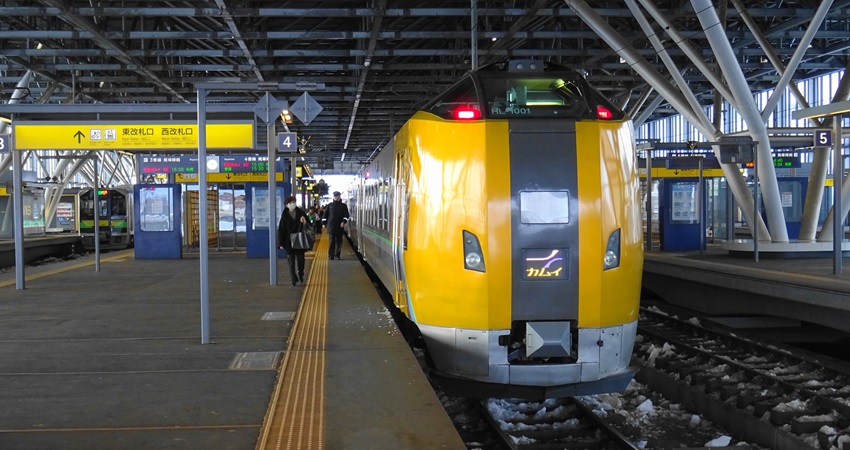
The Limited Express Golden Kamuy at Asahikawa (Jan. 2024)
9.公共政策大学院「公共政策特別研究」(リサーチペーパー)
・K.R.さん「行政による保育所運営に対する支援」(ⅡB)
・O.S.君「産学官連携において大学や行政にしか果たせない役割の研究」(Ⅰ)

Toyota Automobile Museum (Feb. 2024)